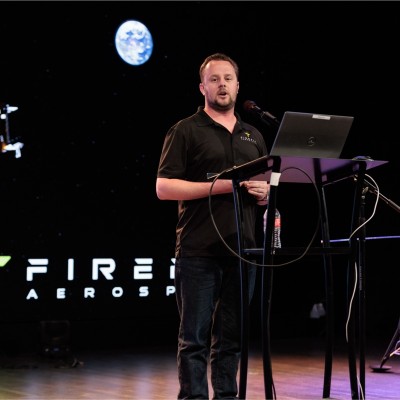Tyler Gilchrist and His Work with Firefly Aerospace
I recently had the opportunity to talk with Tyler Gilchrist, the Payload Integration Manager at Firefly Aerospace. Firefly Aerospace is an end-to-end space transportation company that provides services with launch, orbital, and landing capabilities. Firefly is still a newer company in the space industry, but they have already made their name one to know through partnerships with NASA, Lockheed Martin, and multiple international bodies. I asked Tyler about his role at Firefly, his visions for the future, and advice that he would give to young professionals and students looking to get into the aerospace industry.
I first asked Tyler to detail his role at Firefly and the work that he does. He explained how, as the spacecraft payload integration manager for Blue Ghost mission 2, he serves as a “stand in for whoever isn’t in the room.” Tyler acts as the interface between payload teams attempting to put their projects on the mission and Firefly as the voice for the lander. He works out the requirements, needs, and details for payload teams and Firefly to ensure that every system works together and the overall mission of the Lunar lander is a success. As they are right in the middle of this mission, he is currently working heavily with payload teams to make sure everyone will be able to meet their scientific goals while working cohesively with each other.
After hearing about Tyler’s current work, I was curious to hear what got him interested in joining the space industry and Firefly Aerospace. Tyler explained that he got a love for aerospace in high school after he, a group of friends, and one of their teachers was selected to develop a payload to go to the ISS. This was a “dream come true” for him, and it motivated him to go to college to study aerospace engineering. He said that the process of choosing Firefly was easy as they had just what he was looking for in their work. He loves that he is able to see the progress of his projects in real time, and he enjoys the quick turnaround from idea to completion.
I then asked Tyler about his experience working at Firefly and what the culture of the company is like. Tyler explained that while Firefly has a number of technical advantages that set it apart, the “biggest thing making it special is its culture.” Everyone at Firefly is very passionate about their work. Teams are able to push through the hard times and capitalize on the good ones all with a strong sense of camaraderie and teamwork. There is a high level of care for each other, which helps the finished products to meet their highest standards. Tyler also explained that working at Firefly is nice due to the high level of both accountability and autonomy that he has. He is able to do what he needs to do without being micromanaged, allowing for further creativity in his work. Tyler said that anyone working at Firefly is able to mold their position into whatever they want it to be.
Shifting gears, I asked Tyler about the partnerships that Firefly has with other companies and organizations. He described how Firefly has a number of different partnerships in civil, commercial, military, and even international sectors. From NASA to Lockheed Martin to the UK and Netherlands, Firefly is able to provide their services and receive support from a variety of people. Tyler further explained how, due to his role as payload integration manager, he is in constant, daily communication with these partners to ensure everyone is aware of the progress of the project. With such a complex program, every small detail matters, so it is important to maintain constant communication as further progress is made.
I then asked Tyler to detail his visions for the future of Firefly as a company. He said that their main mission is to continue to “make space available for everybody.” In the next 5 to 10 years, Firefly will continue to provide a level of affordability and reliability that will allow universities and companies who previously couldn't to get into space. All of their platforms—launch, land, and orbit—will hopefully be proven out later this year, allowing Firefly to continue to serve as a one stop shop for affordable space missions. Tyler hopes that Firefly will continue to expand their missions, providing a consistent schedule that allows everyone to take part in the growing industry. He doesn’t want anyone to miss out on their opportunities, so through affordability, reliability, and consistency Firefly is aiming to make a larger impact in the space industry.
After hearing about his visions for the future of Firefly, I asked Tyler about his views on the future of the space industry as a whole. He explained that the developments made in the past couple years have already been significant, but the developments in the near future will continue to broaden the dreams of different companies and universities into what is capable. He sees the space industry continuing to grow through different avenues like partnerships with the civil and military sector and the development of space tourism in the commercial sector. Firefly and other aerospace companies are aiming to allow individuals, companies, and universities to dream big and achieve their goals as easily as possible. Tyler believes that the industry will continue to get larger and larger as people realize what is possible.
To end the interview, I asked Tyler what advice he would give to young professionals or students that want to get into the aerospace industry. His first piece of advice was to “stay humble.” No matter the situation or where you are at, no one knows everything. The aerospace industry has a large wealth of knowledge attached to it, and no one is an expert in every field. Tyler explained that “things begin to fall apart” when you are not open and willing to listen to others. He recalled the time a teacher told him “if you’re 95% right, you’re 100% wrong.” In order for everything to succeed, every detail needs to be checked and flushed out, as there is no room for error. His second piece of advice was to not be constrained by your college degree or past experiences. The aerospace industry is very vast and diverse, so if you have a passion for space you can find a way to apply your skills and knowledge and join the industry. You don’t need to be an aerospace engineer to find yourself working at a company like Firefly, so always be open to your options. He believes that you should reach out to as many people in the field as you can, as many of them are very passionate about what they do and will be more than willing to help you get started.
Sitting down with Tyler and learning more about what Firefly Aerospace does was an amazing opportunity. I enjoyed hearing about his work and his visions for the future of Firefly and the aerospace industry. I am looking forward to staying in touch and keeping up with what Firefly accomplishes over the next few years.

